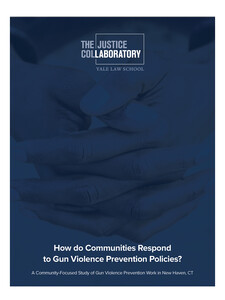Justice Collaboratory Study Focuses on Community Response to Gun Violence Prevention Policies

The study, “How do Communities Respond to Gun Violence Prevention Policies?” sought to better understand the power and influence of gun violence prevention programs through the voices of participants and impacted communities. Specifically, it examined how programs in New Haven, Connecticut impact individuals considered at high risk of being perpetrators or victims of gun violence.
Using a Community-based Participatory Action Research (CBPAR) model, in which researchers and participants work together to develop and conduct a study, the study focused on participants’ experiences with gun violence in New Haven and with programs including Project Longevity, Project Safe Neighborhoods (PSN), and Connecticut Violence Intervention Program (CTVIP). In addition, the study interviewed people who had firearm-related offenses but did not participate in any violence prevention programming.

The New Haven programs that were evaluated use either the Group Violence Intervention (GVI) model (in the case of Project Longevity and Project Safe Neighborhoods) or the Cure Violence model (in the case of the Connecticut Violence Intervention Program).
GVI is a focused-deterrence strategy that targets groups of people at high risk of gun violence, facilitated by law enforcement agencies that identify individuals who are associated with or members of groups responsible for shootings. These individuals receive an antiviolence message from law enforcement agencies partnered with community representatives and social services providers. The Cure Violence Model is a public health approach that addresses violence as a disease to be treated by violence interrupters in the community that mediate conflicts.
The study found that participants perceived intimidation tactics utilized in GVI programs as ineffective and counterproductive in deterring their personal involvement in gun violence. Instead, they advised that future violence prevention programming rely less on intimidation strategies and instead emphasize connecting participants to resources tailored to their individual needs and use strategies that repair trust with communities to address the root causes of gun violence.
Study Recommendations
The study recommends The Credible Messenger mentorship model, in which formerly incarcerated individuals are trained as mentors in their community to engage with youth and prevent violence, as a more effective approach for building trust with youth at the center of gun violence. This mentorship model is strengthened by the authentic relationships formed between mentors and mentees who have similar lived experiences, according to the study.
Mentors engage with mentees through the perspective of having overcome the same barriers and obstacles that mentees are currently facing. Additional research is needed to explore the foundational factors that support this mentorship model, the study states.
Research participants offered additional recommendations for gun violence control, including:
- Providing individuals who have recently returned from incarceration with access to resources and jobs that provide a livable wage and opportunities for true growth and advancement.
- Prioritizing investment and funding opportunities for healing-centered, trauma-informed interventions and community-based violence prevention organizations that measure holistic outcomes beyond recidivism, compliance, and violations. Examples of holistic outcomes include mental and physical health, educational milestones, community involvement, etc.
- Providing youth at the center of gun violence with programming that promotes conflict resolution skills, teamwork, problem solving, and critical thinking skills via specific platforms such as sports, recreation, and artistic expression. Youth need structured activity that is focused on positive prosocial development and provides a pathway for higher educational attainment, entrepreneurship, and career development.
- Ensuring current and future violence prevention programming is co-developed by people who have been directly impacted to increase equitable inclusion and participation in services that impact them and their community.
Recognizing that the program’s participants and beneficiaries can best attest to the influence and power of the message and services received, the study’s authors recommend more studies on gun violence prevention policies from the community perspective.
The Justice Collaboratory at Yale Law School is a group of nationally recognized academics, researchers, and social scientists who have joined together to build a more just, effective, and democratic criminal legal system by advancing public policies that are scientifically proven to build strong and safe communities where all citizens can thrive.


